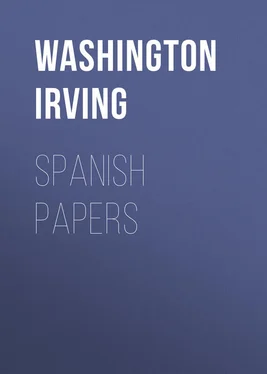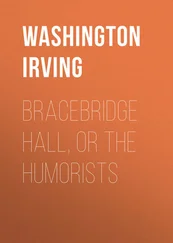Washington Irving - Spanish Papers
Здесь есть возможность читать онлайн «Washington Irving - Spanish Papers» — ознакомительный отрывок электронной книги совершенно бесплатно, а после прочтения отрывка купить полную версию. В некоторых случаях можно слушать аудио, скачать через торрент в формате fb2 и присутствует краткое содержание. Жанр: literature_19, foreign_antique, foreign_prose, на английском языке. Описание произведения, (предисловие) а так же отзывы посетителей доступны на портале библиотеки ЛибКат.
- Название:Spanish Papers
- Автор:
- Жанр:
- Год:неизвестен
- ISBN:нет данных
- Рейтинг книги:4 / 5. Голосов: 1
-
Избранное:Добавить в избранное
- Отзывы:
-
Ваша оценка:
- 80
- 1
- 2
- 3
- 4
- 5
Spanish Papers: краткое содержание, описание и аннотация
Предлагаем к чтению аннотацию, описание, краткое содержание или предисловие (зависит от того, что написал сам автор книги «Spanish Papers»). Если вы не нашли необходимую информацию о книге — напишите в комментариях, мы постараемся отыскать её.
Spanish Papers — читать онлайн ознакомительный отрывок
Ниже представлен текст книги, разбитый по страницам. Система сохранения места последней прочитанной страницы, позволяет с удобством читать онлайн бесплатно книгу «Spanish Papers», без необходимости каждый раз заново искать на чём Вы остановились. Поставьте закладку, и сможете в любой момент перейти на страницу, на которой закончили чтение.
Интервал:
Закладка:
“Father,” said the king, “I have an earnest desire to penetrate the mystery of this tower.” The worthy prelate shook his hoary head. “Beware, my son,” said he; “there are secrets hidden from man for his good. Your predecessors for many generations have respected this mystery, and have increased in might and empire. A knowledge of it, therefore, is not material to the welfare of your kingdom. Seek not then to indulge a rash and unprofitable curiosity, which is interdicted under such awful menaces.”
“Of what importance,” cried the king, “are the menaces of Hercules the Libyan? was he not a pagan? and can his enchantments have aught avail against a believer in our holy faith? Doubtless in this tower are locked up treasures of gold and jewels, amassed in days of old, the spoils of mighty kings, the riches of the pagan world. My coffers are exhausted; I have need of supply; and surely it would be an acceptable act in the eyes of Heaven to draw forth this wealth which lies buried under profane and necromantic spells, and consecrate it to religious purposes.”
The venerable archbishop still continued to remonstrate, but Don Roderick heeded not his counsel, for he was led on by his malignant star. “Father,” said he, “it is in vain you attempt to dissuade me. My resolution is fixed. To-morrow I will explore the hidden mystery, or rather the hidden treasures, of this tower.”
CHAPTER VII
Story of the Marvelous and Portentous Tower.
The morning sun shone brightly upon the cliff-built towers of Toledo, when King Roderick issued out of the gate of the city at the head of a numerous train of courtiers and cavaliers, and crossed the bridge that bestrides the deep rocky bed of the Tagus. The shining cavalcade wound up the road that leads among the mountains, and soon came in sight of the necromantic tower.
Of this renowned edifice marvels are related by the ancient Arabian and Spanish chroniclers, “and I doubt much,” adds the venerable Agapida, “whether many readers will not consider the whole as a cunningly devised fable, sprung from an Oriental imagination; but it is not for me to reject a fact which is recorded by all those writers who are the fathers of our national history; a fact too, which is as well attested as most of the remarkable events in the story of Don Roderick. None but light and inconsiderate minds,” continues the good friar, “do hastily reject the marvelous. To the thinking mind the whole world is enveloped in mystery, and everything is full of type and portent. To such a mind the necromantic tower of Toledo will appear as one of those wondrous monuments of the olden time; one of those Egyptian and Chaldaic piles, storied with hidden wisdom and mystic prophecy, which have been devised in past ages, when man yet enjoyed an intercourse with high and spiritual natures, and when human foresight partook of divination.”
This singular tower was round and of great height and grandeur, erected upon a lofty rock, and surrounded by crags and precipices. The foundation was supported by four brazen lions, each taller than a cavalier on horseback. The walls were built of small pieces of jasper and various colored marbles, not larger than a man’s hand; so subtilely joined, however, that, but for their different hues, they might be taken for one entire stone. They were arranged with marvelous cunning, so as to represent battles and warlike deeds of times and heroes long since passed away, and the whole surface was so admirably polished that the stones were as lustrous as glass, and reflected the rays of the sun with such resplendent brightness as to dazzle all beholders. [11] From the minute account of the good friar, drawn from the ancient chronicles, it would appear that the walls of the tower were pictured in mosaic work.
King Roderick and his courtiers arrived wondering and amazed at the foot of the rock. Here there was a narrow arched way cut through the living stone, the only entrance to the tower. It was closed by a massive iron gate, covered with rusty locks of divers workmanship and in the fashion of different centuries, which had been affixed by the predecessors of Don Roderick. On either side of the portal stood the two ancient guardians of the tower, laden with the keys appertaining to the locks.
The king alighted, and approaching the portals, ordered the guardians to unlock the gate. The hoary headed men drew back with terror. “Alas!” cried they, “what is it your majesty requires of us? Would you have the mischiefs of this tower unbound, and let loose to shake the earth to its foundations?”
The venerable Archbishop Urbino likewise implored him not to disturb a mystery which had been held sacred from generation to generation within the memory of man, and which even Cæsar himself, when sovereign of Spain, had not ventured to invade. The youthful cavaliers, however, were eager to pursue the adventure, and encouraged him in his rash curiosity.
“Come what come may,” exclaimed Don Roderick, “I am resolved to penetrate the mystery of this tower.” So saying, he again commanded the guardians to unlock the portal. The ancient men obeyed with fear and trembling, but their hands shook with age, and when they applied the keys the locks were so rusted by time, or of such strange workmanship, that they resisted their feeble efforts, whereupon the young cavaliers pressed forward and lent their aid. Still the locks were so numerous and difficult, that with all their eagerness and strength a great part of the day was exhausted before the whole of them could be mastered.
When the last bolt had yielded to the key, the guardians and the reverend archbishop again entreated the king to pause and reflect. “Whatever is within this tower,” said they, “is as yet harmless, and lies bound under a mighty spell; venture not then to open a door which may let forth a flood of evil upon the land.” But the anger of the king was roused, and he ordered that the portal should be instantly thrown open. In vain, however, did one after another exert his strength, and equally in vain did the cavaliers unite their forces, and apply their shoulders to the gate; though there was neither bar nor bolt remaining, it was perfectly immovable.
The patience of the king was now exhausted, and he advanced to apply his hand; scarcely, however, did he touch the iron gate, when it swung slowly open, uttering, as it were, a dismal groan, as it turned reluctantly upon its hinges. A cold, damp wind issued forth, accompanied by a tempestuous sound. The hearts of the ancient guardians quaked within them, and their knees smote together; but several of the youthful cavaliers rushed in, eager to gratify their curiosity, or to signalize themselves in this redoubtable enterprise. They had scarcely advanced a few paces, however, when they recoiled, overcome by the baleful air, or by some fearful vision. [12] Bleda, Cronica , cap. 7.
Upon this, the king ordered that fires should be kindled to dispel the darkness, and to correct the noxious and long-imprisoned air; he then led the way into the interior; but, though stout of heart, he advanced with awe and hesitation.
After proceeding a short distance, he entered a hall or ante-chamber, on the opposite side of which was a door, and before it, on a pedestal stood a gigantic figure, of the color of bronze and of a terrible aspect. It held a huge mace, which it whirled incessantly, giving such cruel and resounding blows upon the earth as to prevent all further entrance.
The king paused at sight of this appalling figure, for whether it were a living being, or a statue of magic artifice, he could not tell. On its breast was a scroll, whereon was inscribed, in large letters, “I do my duty.” [13] Bleda, Cronica cap. 7.
After a little while, Roderick plucked up heart, and addressed it with great solemnity. “Whatever thou be,” said he, “know that I come not to violate this sanctuary, but to inquire into the mystery it contains; I conjure thee, therefore, to let me pass in safety.”
Интервал:
Закладка:
Похожие книги на «Spanish Papers»
Представляем Вашему вниманию похожие книги на «Spanish Papers» списком для выбора. Мы отобрали схожую по названию и смыслу литературу в надежде предоставить читателям больше вариантов отыскать новые, интересные, ещё непрочитанные произведения.
Обсуждение, отзывы о книге «Spanish Papers» и просто собственные мнения читателей. Оставьте ваши комментарии, напишите, что Вы думаете о произведении, его смысле или главных героях. Укажите что конкретно понравилось, а что нет, и почему Вы так считаете.












